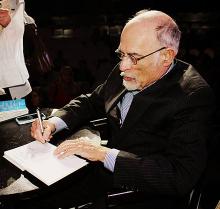What Is It
To many death is terrifying. But why? As David Hume pointed out, all the years we didn't exist before we were born seemed painless enough. Why worry about future non-existence? Is the real worry that we will continue to exist? Ken and John confront mortality with psychiatrist and novelist Irv Yalom, author of Staring at the Sun: Overcoming the Terror of Death. This program was recorded before a live audience at The Marsh theater in San Francisco.
Listening Notes
John kicks off the show by criticizing its title: who says that death is terror inducing? Why imply that this terror is a bad thing, and overcoming this terror is a good thing? Ken and John start off the discussion with Irv Yalom by asking when fear of death kicks in, and how it kicks in. When we hit big birthdays or get hit by severe illness, how should we respond? What attitudes are healthy and life affirming, and what attitudes are paralyzing? Ken, John and Irv talk about the rational bases of various responses. If there is nothing after death, does that make life meaningless? They discuss the implications of Lucretius’ old (very old – from ancient Greece) ‘symmetry argument’ . They then discuss the fear of everything surrounding death: even if we can convince ourselves not to fear death, how can we avoid fearing pain, regret, and loss of cognitive capacities? What about the right to die, when you want to die?
The last section begins with a question for Irv: how does he, as a therapist, help those who fear death? Irv discusses how he works through his own thoughts on death, and the kinds of discussions he has with patients about philosophy, dreams, and regrets. He focuses on the importance of dealing with regrets from the past, and preventing them in the future. Ken and John then let an adoring audience flood Irv with questions. He discusses dealing with those dealing with death, models of a good death, and how he, as a therapist, deals with his own death (namely, by getting more therapy). John and Ken end with concluding remarks: John tells a mediocre joke, Ken quotes Shakespeare.
- Roving Philosophical Report (seek to 6:50): Zoe Corneli interviews William Lure, who has spent years working in end of life care. William talks about peaceful passings, faith, terror, and the meaning of death.
- 60-Second Philosopher (seek to 4:55): Ian Shoales leads a whirlwind tour through a range of philosophical thoughts on the rationality of fearing death, from James Boswell and David Hume, to Mormonism, to Lucretius, and – finally – the analogy between pre-existence and pre-school.

Comments (4)
RepoMan05
Sunday, October 6, 2019 -- 8:28 AM
Life will do this to youLife will do this to you eventually all on it's own. It's not necessarily a good thing to encourage. A fear of death is the strongest tool nature ever found to keep life going. It is tho as if whatever force behind the creation-evolution of life, didnt want the resentment of life. Perhaps it just works out that way for virtue of not being malicious, but maybe not.
All the struggle, all the torment, all the subjectivity to make you a victim, all the subjectivity to make you guilty, all the lies, all the losses, all the bad memories, all the fleeting good memories all go away in the end. There's a lot of comfort to take away from that. A concept of compete non-existance can be unimaginably comforting if you open your mind. No eternity would ever fail to become a hell. They say its a part of you that makes you see it this way. Something that could be removed from you to let you exist forever. But would you not miss that part of you? We're not all dumb enough to think an eternal afterlife were desirable.
RepoMan05
Sunday, October 6, 2019 -- 8:31 AM
Anything can be a poison. ItAnything can be a poison. It's simply a matter of dosage.
RepoMan05
Sunday, October 6, 2019 -- 8:33 AM
Spreadsheetism is the worstSpreadsheetism is the worst philosophy.
RepoMan05
Sunday, October 6, 2019 -- 8:49 AM
Well what they ckearly meanWell what they clearly mean to say about pre-existance is to say "pre-caporeal existence." yaknow, as if they know what that means when they need to. But but then they dont know what that means when they need to also; and thats supposed to mean something? Then they condemn philosophy for being open ended....?
The fruits of two dimensional thinking are probably always poisonous.
"They" = theists